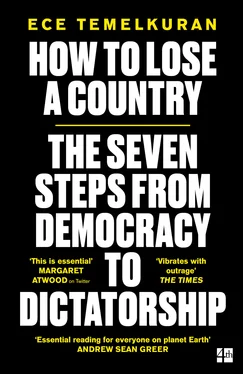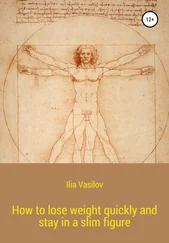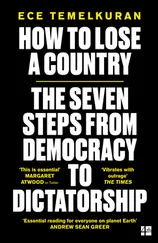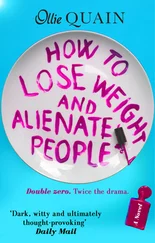We always holds its challengers to ethical standards (such as objectivity) that it does not itself feel obliged to meet, because the original owners of we have a monopoly on morality and the privilege of being the real voice of the masses. End of story. Critical voices become so paralysed that they don’t notice that the ‘respect’ we demand of them is actually an unquestioning silence.
The magic word ‘respect’ is also frequently used by the right-wing Hungarian leader Viktor Orbán. ‘Respect to the Hungarians!’ was his party’s 2014 European Parliament electoral slogan. Between then and the end of 2017, Orbán relentlessly reiterated the central importance of respect. He demanded respect from Germany, the United States and the EU, and when attacked for his xenophobic policies he replied: ‘According to my thinking, this is a sign of respect.’ He announced his solidarity with Poland because Poland wasn’t respected enough, and offered his respect to Trump, Vladimir Putin and Erdoğan. He also complained that ‘respect is a scarce commodity in Europe’, and asserted that only respect could save the continent.
Erdoğan likewise introduced excessive amounts of ‘respect’ into Turkish politics after he came to power in 2002. He repeatedly demonstrated to the Turkish people that respect no longer had to be earned, it could simply be unconditionally demanded. Whenever there were serious poll-rigging claims, he demanded respect for ‘my people and their choices’, just as he demanded respect for court decisions only when they resulted in his opponents being imprisoned. However, when the Constitutional Court decided to release journalists arrested for criticising him, he said, ‘I don’t respect the court decision and I won’t abide by it.’ As with Orbán, Trump and others, respect is a one-way street for Erdoğan: he only accepts being on the receiving end.
‘[Respect] is what Putin really wants,’ wrote Fiona Hill in a piece for the Brookings Institution’s website in February 2015. §She continued, ‘He wants respect in the old-fashioned, hard-power sense of the word.’
‘You come to me and say, “Give me justice.” But you don’t ask with respect.’ This quote comes not from another respect-obsessed political leader, but from Don Corleone, in the opening scene of The Godfather . One might easily mix them up, because the global circuit of exchanged respect (Geert Wilders respecting Farage, Farage respecting Trump, Trump respecting Putin, Putin asking for more respect for Trump, and all the way back round again, much as Hitler and Stalin once voiced their respect for one another) has started to sound like some supranational mafia conversation. The web of respect among authoritarian leaders has expanded so much that one might forget that this whole masquerade started on a smaller scale, with a seemingly harmless question. It started when the ordinary people began transforming themselves into real people by demanding a little bit of political politeness: ‘Don’t we deserve some simple respect?’
But here’s how the chain of events goes further down the line when respect becomes a political commodity. When the real people become a political movement, their initial, rhetorical question is this: ‘Do our beliefs, our way of life, our choices not matter at all?’ Of course, nobody can possibly say that they do not, and so the leaders of the movement begin to appear in public, and take to the stage as respected, equal contributors to the political discussion.
The next password is tolerance , tolerance for differences. Then some opinion leaders, who’ve noticed social tensions arising from polarisation in the public sphere, throw in the term social peace . It sounds wise and soothing, so nobody wants to dismiss it. However, as the movement gains momentum, tolerance and respect become the possessions of its members, which only they can grant to others, and the leader starts pushing the ‘social peace’ truce to the limits, demanding tolerance and respect every time he or she picks a new fight.
But at a particular point in time, respect becomes a scarce commodity. For Turkey, this invisible shift happened in 2007, on the election night that brought the AKP a second term in power. Erdoğan said, ‘Those who did not vote for us are also different colours of Turkey.’ At the time, for many political journalists the phrase sounded like the embracing voice of a compassionate father seeking social peace. However, not long afterwards, Erdoğan started speaking Godfather. He stopped asking for respect and raised the bar, warning almost everyone, from European politicians to small-town public figures, that they were required to ‘know their place’. And when that warning was not enough, he followed it up with threats. On 11 March 2017, Turkey was mired in a diplomatic row with Germany and the Netherlands after they banned Turkish officials from campaigning in their countries in support of a referendum on boosting the Turkish president’s powers. Erdoğan said, ‘If Europe continues this way, no European in any part of the world can walk safely on the streets.’ In threatening an entire continent, he’d become the cruel Michael Corleone of The Godfather Part II .
Even for those countries that have only recently begun to experience a similar social and political process, this chain of events is already beginning to seem like a cliché. Nevertheless, the way in which the logic of contemporary identity politics serves this process is still relatively novel, and is rarely discussed. In the twenty-first century it’s much easier for right-wing populist movements to demand respect by wrapping themselves in the bulletproof political membrane of a cultural and political identity and exploiting a political correctness that has disarmed critical commentators. Moreover, the use of a sacrosanct identity narrative turns the tables, shining the interrogator’s lamp on the critics of the movement instead of on the movement itself, making them ask, ‘Are we not respectful enough, and is that why they’re so enraged?’ As the opposition becomes mired in compromise, the movement begins to ask the probing questions: ‘Are you sure you’re not intimidating us out of arrogance? Can you be certain this is not discrimination?’
And we all know what happens when self-doubting intellect encounters ruthless, self-evident ignorance; to believers in the self-evident, the basic need to question sounds like not having an answer, and embarrassed silence in the face of brazen shamelessness comes across as speechless awe. Politicised ignorance then proudly pulls up a chair alongside members of the entire political spectrum and dedicates itself to dominating the table, elbowing everyone continually while demanding, ‘Are you sure your arm was in the right place?’ And the opposition finds itself having to bend out of shape to follow the new rules of the table in order to be able to keep sitting there.
‘We become increasingly uncomfortable when people take advantage of our freedom and ruin things here.’
These words came from a Dutch politician, but not the notorious xenophobe Geert Wilders. They are from his opponent, the Dutch prime minister and leader of the centre-right Liberal Party, Mark Rutte, in a letter to ‘all Dutch people’ published on 23 January 2017. Although the words seemingly referred to anyone who ‘took advantage’, they were in fact aimed at immigrants. Rutte’s opposition to right-wing populism was being distorted by the fact that he felt obliged to demonstrate that he shared the concerns of the real people : ordinary, decent people. He must have felt that in order to keep sitting at the top table of politics, he had to compromise. And this is the man who two months later would bring joy to Dutch liberals by beating Wilders. Many Dutch voters accepted, albeit unwillingly, the new reality in which the least worst option is the only choice. The manufactured we is now strong enough not only to mobilise and energise supporters of the movement by giving them a long-forgotten taste of being part of a larger entity, but to affect the rest of the political sphere by pushing and pulling the opposition until it transforms itself irreversibly. It creates a new normality, which takes us all closer towards insanity.
Читать дальше












